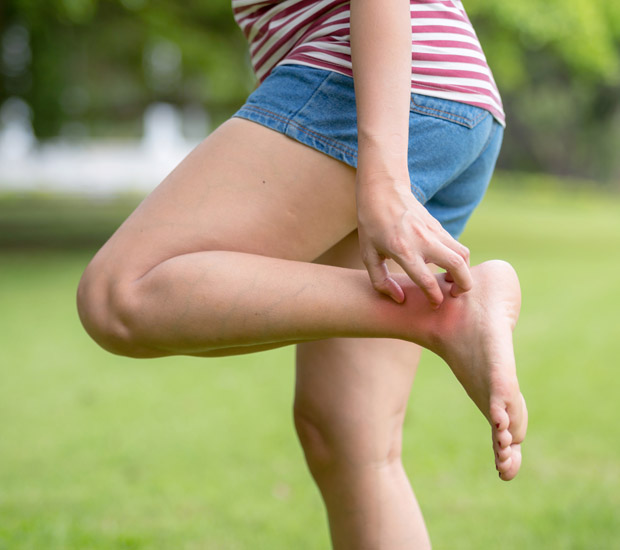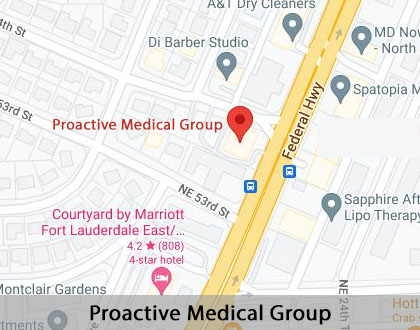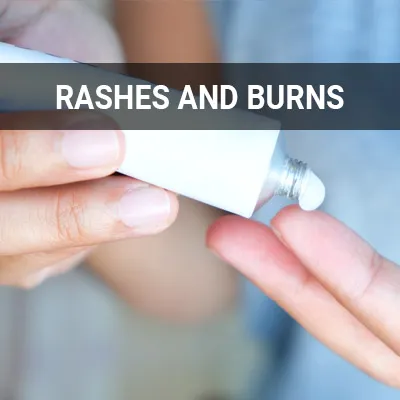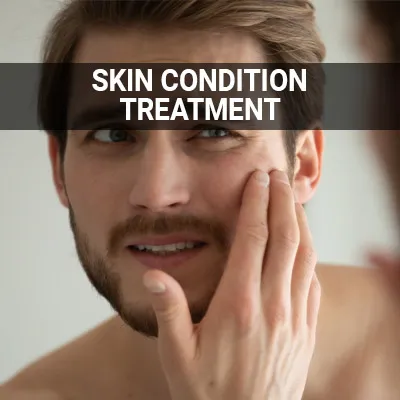Insect Bites and Sting Treatment Fort Lauderdale, FL
Insect bites and stings can have various effects, from mild stinging and itching to life-threatening allergic reactions. These effects impact people differently depending on the type of insect bite, allergies, and diseases the insect may be carrying. People experiencing persistent stinging or other severe reactions to an insect bite or sting can seek treatment from a primary care doctor.
Insect bites and stings can be checked at Proactive Medical Group in Fort Lauderdale and the surrounding area. Our staff can help you determine the best course of treatment to alleviate symptoms. Call us at (954) 938-2843 to learn more about our services or schedule an appointment.
Treatment for Insect Bites and Stings
A primary care physician can treat insect bites and stings that display symptoms such as redness, itchiness, stinging, and burning. Treatments may include ointments and creams, thoroughly cleaning the bite, and using a cold pack to reduce swelling. Our physician may also prescribe anti-itching creams or ointments coupled with an oral antihistamine medication that reduces itching.
In some cases, symptoms may persist even with ointments and medication. If our physician notices signs of an allergy, they may refer the patient to an allergy specialist. However, a patient with severe symptoms should go to the emergency room immediately to seek professional medical treatment.
“Treatments may include ointments and creams, thoroughly cleaning the bite, and using a cold pack to reduce swelling.”
About Insects Bites and Stings
Knowing and recognizing the common insects that cause itching, swelling, and other conditions is important. Some insects whose bites or stings can cause adverse reactions may include mosquitos, spiders, ticks, bees, fleas, and bed bugs. An insect sting introduces venom into the body, causing burning, itching, redness, and other related symptoms.
If a person is allergic to venom, it can cause anaphylactic shock, a severe allergic reaction. This reaction most commonly occurs from bee stings. Insect bites can cause similar reactions, but the body reacts to the substances in the insect's saliva instead of responding to the venom. A primary care physician can diagnose the type of insect bite and determine the appropriate treatment. If symptoms or discomfort persist, the physician may need to run allergy tests or refer the patient to a specialist.
“A primary care physician can diagnose the type of insect bite and determine the appropriate treatment.”
Types of Reactions
When a patient comes in for a sting or bite, a primary care physician will classify the reaction as local, papular urticaria, or systemic.
Local Reactions
Local reactions are limited to the location of the bite or sting and are usually minor reactions. Symptoms occur at the site of the punctured skin and result in mild itching, redness, and swelling. A local reaction for someone with an allergy can cause severe difficulty breathing, hives, dizziness, swelling of the face or throat, and rapid pulse. These symptoms usually occur within minutes of the injury but may worsen over time.
Papular Urticaria
Papular urticaria refers to a specific allergic reaction that causes intense and chronic itching stemming from swollen spots on your skin. There is usually a delay between the bite and the time the swollen bump or lesion becomes visible. New lesions may appear and cause itching that reactivates old injuries, leading to a long cycle that may last from months to years. It often occurs on exposed areas of the skin, such as the arms, lower legs, upper back, and scalp. Treatment may include oral antihistamines and topical steroid creams to alleviate symptoms caused by the immune system.
Systemic Reactions
Systemic reactions are more severe allergic reactions, affecting other body areas due to the immune system. This severe reaction usually happens anywhere between two minutes to two hours after the bite or sting. Systemic symptoms include itching, redness, burning, difficulty breathing, low blood pressure, and swelling of the upper body, face, tongue, or throat. A primary care physician will follow strict protocol if they believe the patient is having a systemic reaction. This may include administering epinephrine and IV fluids to combat the allergic response.
“When a patient comes in for a sting or bite, a primary care physician will classify the reaction as local, papular urticaria, or systemic.”
Check out what others are saying about our primary care physician services on Yelp: Insect Bites and Sting Treatment in Fort Lauderdale, FL
Diseases Transmitted By Insects
Insects can also carry diseases that are transferable to humans. Many of these diseases are a result of increased travel, especially international travel. For example, ticks are known for causing various diseases specific to different regions in the United States and abroad but may travel and find new hosts in other areas.
Diseases transmitted from various insects found in the U.S. include Lyme disease, Rocky Mountain spotted fever, West Nile virus, malaria, and yellow fever. While rare, more serious illnesses can be transmitted through a simple insect bite or sting. People experiencing persistent or abnormal symptoms can receive help from a primary care physician. During the appointment, it is crucial to notify our team about any travel or bites recently experienced.
“Insects can also carry diseases that are transferable to humans.”
Questions Answered on This Page
Q. What treatments can help insect bites and stings?
Q. What happens if an insect bites or stings someone?
Q. What types of reactions can occur from bites and stings?
Q. What are some of the commonly transferred diseases prevalent in the U.S?
Q. What skin conditions can mimic an insect bite or sting?
People Also Ask
Q. What are the symptoms of pink eye?
Q. What types of treatment does a primary care doctor offer for injuries?
Skin Conditions Mistaken for Insect Bites and Stings
Several conditions can mimic the appearance and symptoms of insect bites and stings. This can result in people treating their skin condition the same as a typical bug bite. While this treatment may reduce some swelling or itching, it will not address the underlying condition. Common skin conditions that can appear like an insect bite or sting include folliculitis, lymphomatoid papulosis, and Pityriasis lichenoides et varioliformis acuta (PLEVA).
Each of these skin disorders has different causes and treatments. Fortunately, a primary care physician can determine whether a patient's symptoms are due to an insect bite or sting or another condition that requires a specialist. Seeing a medical professional will help people receive a proper diagnosis and treat the root problem of their skin condition.
“Several conditions mimic the appearance and symptoms of insect bites and stings, which may lead the victim to treat it the same way as typical bug bites.”
Frequently Asked Questions
Q. How can I treat multiple or recurring insect bites?
A. If you are constantly being bit or stung, it is a good idea to find the source of the problem (i.e., in the bedding, backyard, or bathroom). Regular sanitation of the home and other frequently used areas can help eliminate or reduce insect bites. With minor bites and stings, make sure to remove the stinger, as it can continue to excrete venom throughout the body, and clean the bite thoroughly.
Q. What action should I take if someone is experiencing a severe reaction to an insect bite or sting?
A. In severe insect bite or sting cases, a person may be unable to breathe, react, take medication, or seek emergency help alone. First, check to see if they have an epinephrine auto-injector (EpiPen, Auvi-Q, others) to treat an allergic reaction. It is best to get the person emergency treatment as soon as possible.
Q. Are there any natural home remedies to combat minor bites and stings?
A. Cold compressions and concentrated heat (baths, heat pads) can significantly reduce swelling and itchiness. Antihistamines and hydrocortisone topical creams combat the inflammatory response with bug bites and reduce inflammation and itchiness. Natural remedies that have some of the same healing properties are honey and aloe vera.
Q. When should an insect bite or sting be alarming if I do not have allergies?
A. If minor symptoms are not improving within a few days with home care remedies, there may be an underlying issue. Bites or stings that occur in the mouth, throat, or near the eyes call for more urgent medical care. If a bite or sting causes a large area around the bite (10 cm or more) to become red and swollen, it often means the person is having an allergic reaction.
Q. What kind of insect bite could I have if my symptoms do not match those of common bites?
A. Most bites and stings result in the common symptoms listed above (itchiness, redness, and swelling). If the infected area is more of a welt, it will look like a raised, red patch; if it is a blister, it will produce a pocket of fluid and pus. Welts and blisters come from beetle bites and are generally more painful. Patients with beetle bites should take the same precautions and follow the same protocol as other insect bites.
Start Feeling Better – Visit Us Today
By visiting us as soon as possible, our team can help get you the professional treatment you need. Instead of waiting around and allowing the symptoms to get worse, we can provide you with treatment options.
Definition of Medical Terminology
Call Us Today
A primary care physician can help people with bug bites or stings that produce abnormal or persistent symptoms. Our team at Proactive Medical Group is here to help. Call us today at 954-938-2843 to learn more about our services or schedule an appointment.
Helpful Related Links
- American Association of Poison Control Centers. American Association of Poison Control Centers. 2023
- American Journal of Medicine. American Journal of Medicine. 2023
- American Medical Association (AMA). American Medical Association (AMA). 2023
- Health Resources & Services Administration Poison Center Resources. Health Resources & Services Administration Poison Center Resources. 2023
- Infectious Diseases Society of America. Infectious Diseases Society of America. 2023
- International Society of Infectious Diseases. International Society of Infectious Diseases. 2023
About our business and website security
- Proactive Medical Group was established in 2022.
- We accept the following payment methods: American Express, Cash, Check, Discover, MasterCard, and Visa
- We serve patients from the following counties: Broward County
- We serve patients from the following cities: Fort Lauderdale, Oakland Park, Wilton Manors, Pompano Beach, and Sea Ranch Lakes
- Norton Safe Web. View Details
- Trend Micro Site Safety Center. View Details
Back to top of Insect Bites and Sting Treatment










